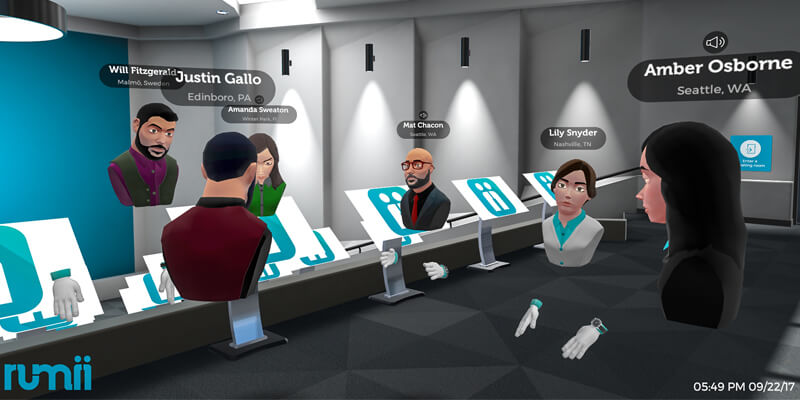In today’s Conversations, we are joined by Elbert Perez, co-founder and chief technical officer of Doghead Simulations, a virtual reality conferencing software startup. Elbert is no stranger to VR, having worked for HTC as a senior software prototyper for the HTC Vive.
While virtual reality has become synonymous to immersive gaming experience, and Elbert’s experience and specialization have been largely on game development, his startup Doghead Simulations puts forward another use case for VR – a conferencing and collaboration tool for distributed teams worldwide.
We talk about rumii, Doghead Simulations’ flagship product; the advantages as well as the current challenges of VR technology, and finding a niche in the VR world that is largely focused on entertainment and gaming.
First of all, can you explain what rumii is?
Rumii is a VR conferencing and collaboration tool built from the ground up specifically for business and enterprise users. We offer customizable virtual meeting spaces, a very robust avatar system, and a widget system that can display images, PDF files, 3D models, and desktop sharing.
Why focus on virtual reality-based teleconferencing systems, and why VR specifically, instead of also offering augmented reality or mixed reality-compatible services?
We are focusing on virtual reality right now because there is a market we can tap into with more than 6 million virtual reality conferencing capable headsets sold in 2016. VR also offers many advantages like a fully immersive environment with little to no distraction, and with VR you really get the sense of presence that teleconferencing systems can only dream of. With regards to wearable AR and MR, there are no consumer devices out yet that can be bought by a standard business or consumer. In a nutshell, we believe that VR is ready now and the near future, while AR and MR is something that needs to mature more and develop a consumer market.
Why should one choose your product rumii as opposed to other Social VR products like AltspaceVR or VRChat?
Our product is built around what our business customers need. Other social VR experiences are geared towards the consumer and their needs. I truly believe these two markets will co-exist as they have very different use cases.
Don’t you think not having a VR-hardware specifically designed for rumii puts you at a severe disadvantage compared to, say, a 3-in-1 product package from Microsoft, e.g., Hololens, MR, cloud-based Skype?
We are hardware agnostic, we support non-VR teleconferencing via the Desktop mode on PC and Mac. We support the Rift, Vive and the Windows Mixed Reality devices. We create the software that goes into the headsets. That means we can have our product on more headsets than any competitor that makes their software only work on one.
Snapshots from the rumii auditorium.
© Doghead Simulations
One issue with conventional voice/video teleconferencing is that people from locations with relatively slow internet speeds cause annoying disruptions to the entire group’s discussions due to dropped calls, garbled conversations, etc. Introducing VR into the system would probably make this problem worse. Does rumii have any special feature or capability designed to make the problem less unpleasant?
If you can stream a YouTube video, then you can use rumii. The truth of the matter is, we cannot eliminate voice lag because we run through the same network everybody does. But what we do offer is the sense of presence. For example, when people meet face to face we have so much non-verbal communication happening from the moment you see the person. In video calls, most of this non-verbal communication is lost due to the un-personal nature of 2D screens. But in VR, we are able to transmit a majority of these ques, like a simple hand gesture, or a nod of agreement.
Lastly, where do you see your company and the entire VR/AR/MR industry 5 years from now?
I envision that people have become increasingly dependent on the immersive technologies (VR, AR, MR) as they become more accessible to the non-technical crowd. As more companies move to have global work forces, the need to communicate effectively increases. That is where rumii comes in and enables these distributed teams to work as if they are in the same office.
ABOUT ELBERT

Elbert Perez started out as an independent game developer, with currently over 20 published games under his name. In Microsoft, he worked as technical producer and worked on products like the Xbox One, Windows Phone and SmartGlass. At HTC Creative Labs, he worked as Senior Prototype developer and was responsible for bringing the HTC Vive to the market. He is the co-founder and chief technical officer of Doghead Simulations.
CONVERSATIONS: Our Future
In Conversations: Our Future, we catch up with innovators and thought leaders in their respective fields to talk about the future — innovations, markets, current events and how technology shapes them all.[/vc_column_text][/vc_column][/vc_row]






